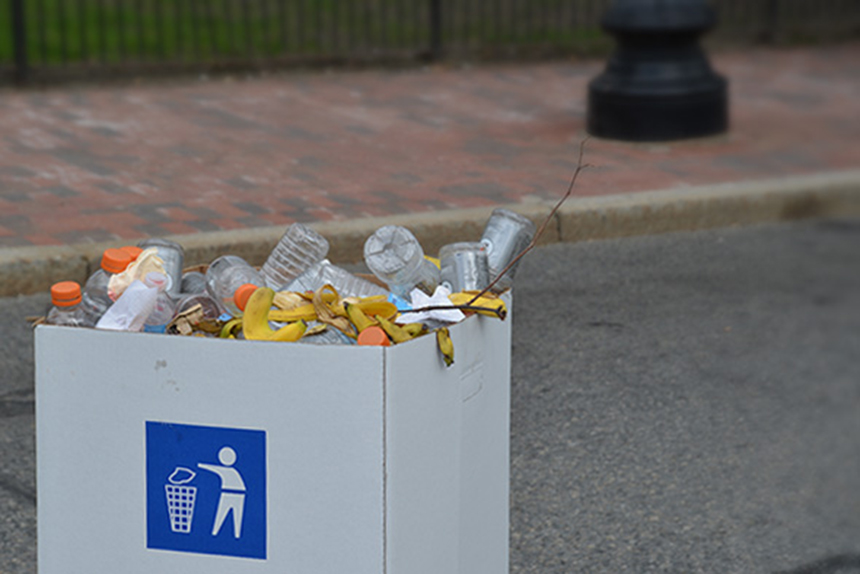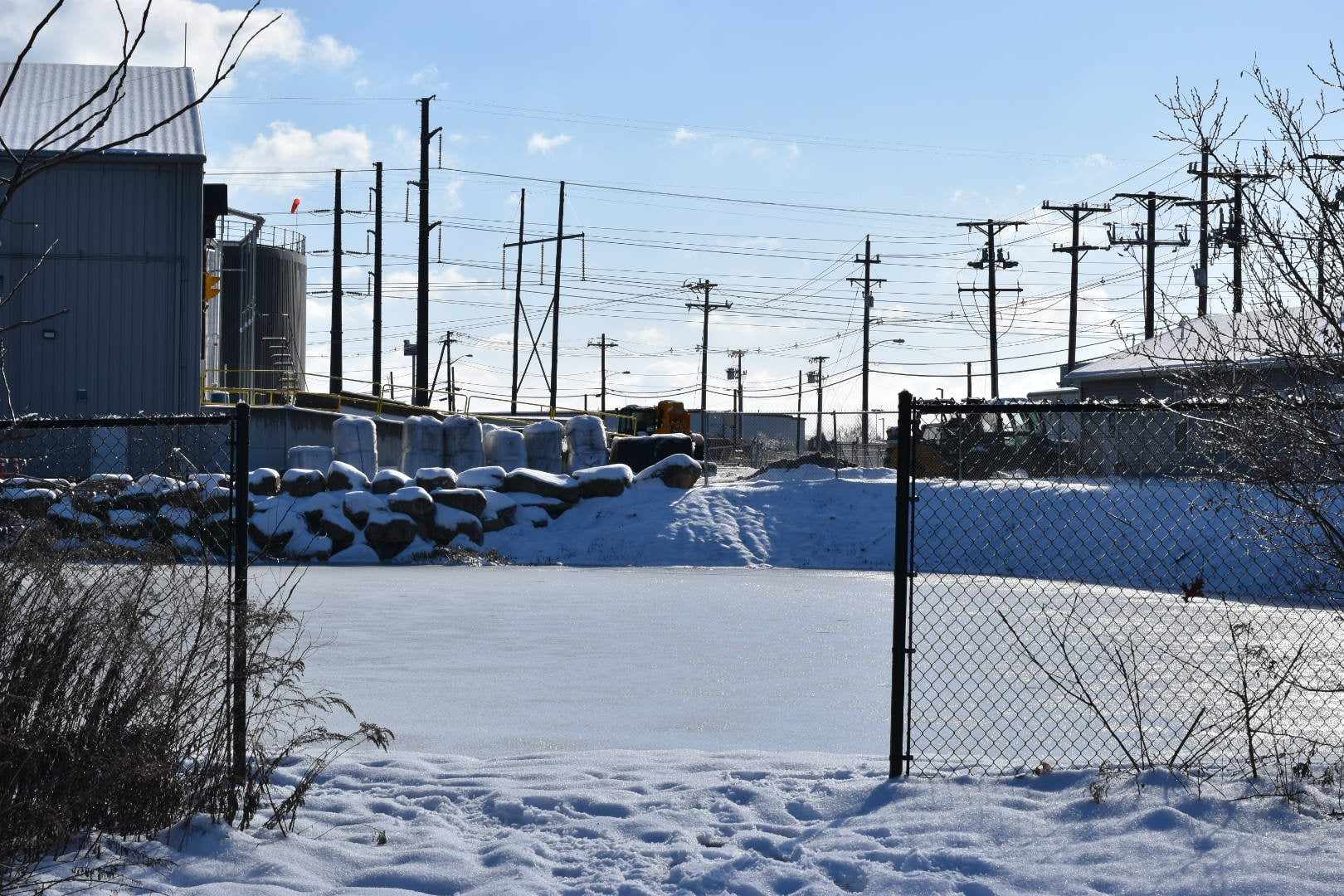Reusable Bags Sacrificed to Fight Coronavirus
Is plastics industry stoking public fear and undermining bag bans?
May 11, 2020
As the stay-at-home order is lifted and Rhode Island businesses slowly reopen, many suspended bag bans and restrictions on reusable bags are still in place.
Sixteen communities have approved plastic-bag bans since Barrington passed the state’s first municipal ban in 2012. But since the pandemic took hold in March, more than half have paused their ordinances over health concerns and needed relief for businesses.
South Kingstown suspended its ban April 8, citing a shortage of paper bags as well as a fear that reusable bags spread the coronavirus. The ban is causing undue hardship for retailers, according to an executive order, and “reasonable concern about whether reusable plastic bags might serve as a vector for the SARS-COV-2 virus that causes COVID-19.”
Narragansett, which doesn’t have a bag ban, ordered the suspension of reusable bags out of fear that the bags might make people sick.
“The Town has been advised that the use of reusable bags brought into the store by customers may be contaminated with the COVID-19 virus from outside sources,” town manager James Tierney wrote in a March 27 press release. “PLEASE stop using REUSABLE BAGS temporarily in all retail businesses in the Town of Narragansett in an effort to avoid the transmission of the COVID-19 virus.”
Tierney said concern about paper bag shortages and the virus spreading via reusable bags came from daily conference calls with Rhode Island’s 39 mayors and town managers. Those discussions about bags prompted the Portsmouth Town Council to suspend its bag ban for six months.
Portsmouth town manager Richard Rainer Jr. and director of business development Richard Talipsky said suspending the ordinance is a small favor to local businesses who said they are struggling to find paper bags. Single-use plastic bags, they said, are considered safer than paper and reusable bags.
“If we use clean plastic bags, that would minimize the transfer of the potential virus from reusable bags that are being handled by the baggers,” Talipsky said during the April 8 Town Council meeting.
Federal guidance is absent on reusable-bag use and any hazards they may pose during the pandemic. A theoretical risk exists, as demonstrated by a 2010 study conducted by the University of Arizona that found bacteria on 99 percent of reusable bags tested. (The American Chemistry Council underwrote the research project.) There are, however, no reports of the bags spreading the coronavirus.
A paper bag shortage doesn’t appear to have materialized either, but there are predictions that one will occur once New York state’s bag ban takes effect June 15.
Environmentalists fear the moratorium on bag bans will reverse gains made in recent years to curtail single-use items such as plastic shopping bags, straws, and to-go containers. The plastics industry is stoking public fear and undermining bag bans by promoting single-use plastics as a way to curb to infection during the health crisis, according to Greenpeace.
Fossil-fuel companies, which are hurting from decreased gasoline sales, and plastics manufacturers are lobbying Congress for broader use of plastic packaging and for funding — all of which can be done by classifying plastics as an essential industry.
“For years, the plastics industry has funded and promoted research to try to discredit the growing movement to end single-use plastic pollution,” according to Ivy Schlegel, a senior research specialist with Greenpeace. “And when COVID-19 began to spread, they saw a chance to strike and activate their network of pro-plastic surrogates.”
Leaders of Rhode Island’s municipal bag ban efforts are also leery of the pro-plastics campaign.
Barrington Town Council vice president Kate Weymouth said it will be “an uphill battle to reverse the trend, as the plastics industry got out so far ahead on this from the beginning, convincing people that reusable bags carried the virus.”
Dave McLaughlin, executive director of Middletown-based Clean Ocean Access said strong alliances across the state will sustain efforts to reduce litter. The movement, he said, remains positive.
“For now we are remaining positive that these short-term allowances are not going to become part of a new normal,” McLaughlin said. “Nevertheless, the environment and the environmental movement will continue and intensify as we now have never-seen-before views of mountains and clean air in big cities that are making people realize that a healthy planet is what we all need.”
For years, efforts to pass a statewide bag ban have died in the General Assembly, although a bill championed by Senate President Dominick Ruggerio passed the Senate on Feb. 26. Before the health crisis halted the General Assembly in March, the legislation appeared likely to clear the House and move on to Gov. Gina Raimondo’s desk. Raimondo has said she supports a ban, and her Task Force to Tackle Plastics recommended a statewide bag ban last year.
Without a statewide ban, Raimondo can’t suspend or reinstate local bag bans, as Gov. Gavin Newsom did April 22 by suspending California’s bag ban. Maine also suspended its bag ban. Massachusetts suspended the use of reusable bags.
Raimondo recently made comments that restaurants should use disposable cups, napkins, and utensils when they reopen. So far, none of the guidelines in Phase 1 of her plan to restart the economy mention bag use or disposable food service items.
In the absence of town rules, grocery stores have their own policies. Shaw’s will not allow staff to handle reusable bags, but consumers may fill reusable bags themselves. Walmart, Whole Foods, and Target permit customers to pack their reusable bags. Trader Joe’s prohibits reusable-bag use. Dave’s Fresh Marketplace asks customers not to bring reusable bags, but, if they do, to fill them in their carts.
One silver lining regarding waste: The Central Landfill in Johnston has seen a 47 percent decline in commercial trash compared to last year and municipal waste has decreased 3 percent.
Here’s where other Rhode Island municipalities stand on their bag bans:
East Greenwich was one of the first to pause its ban on plastic bags. Town manager Andrew Nota approved it to make it easier for restaurants to offer takeout orders.
Warren halted its bag ban March 30 to help essential businesses stay open, according to Town Council president Keri Cronin.
“As things change and evolve we can keep in line with what the state is doing,” Cronin said.
Once businesses are back, Cronin intends to continue the campaign against plastic waste and consider restrictions on plastic straws and foam containers.
Bristol suspended its bag ban April 3 “to protect the health and safety of essential businesses, employees, and shoppers.”
North Kingstown temporarily waived it bag ban April 1 “due to shipment issues and the discouragement and ban of reusable bags.”
Providence, which started its ban last October, hasn’t suspended its ordinance, nor has it placed restrictions on reusable bags.
East Providence suspended its bag ban from March 26 through May 8.
Cranston’s bag ban doesn’t take effect until next year.




Everything I have seen says plastic is more likely to have live viruses on them for longer than paper or cloth. Just more lies from the plastics industry and its fossil fuel backers.